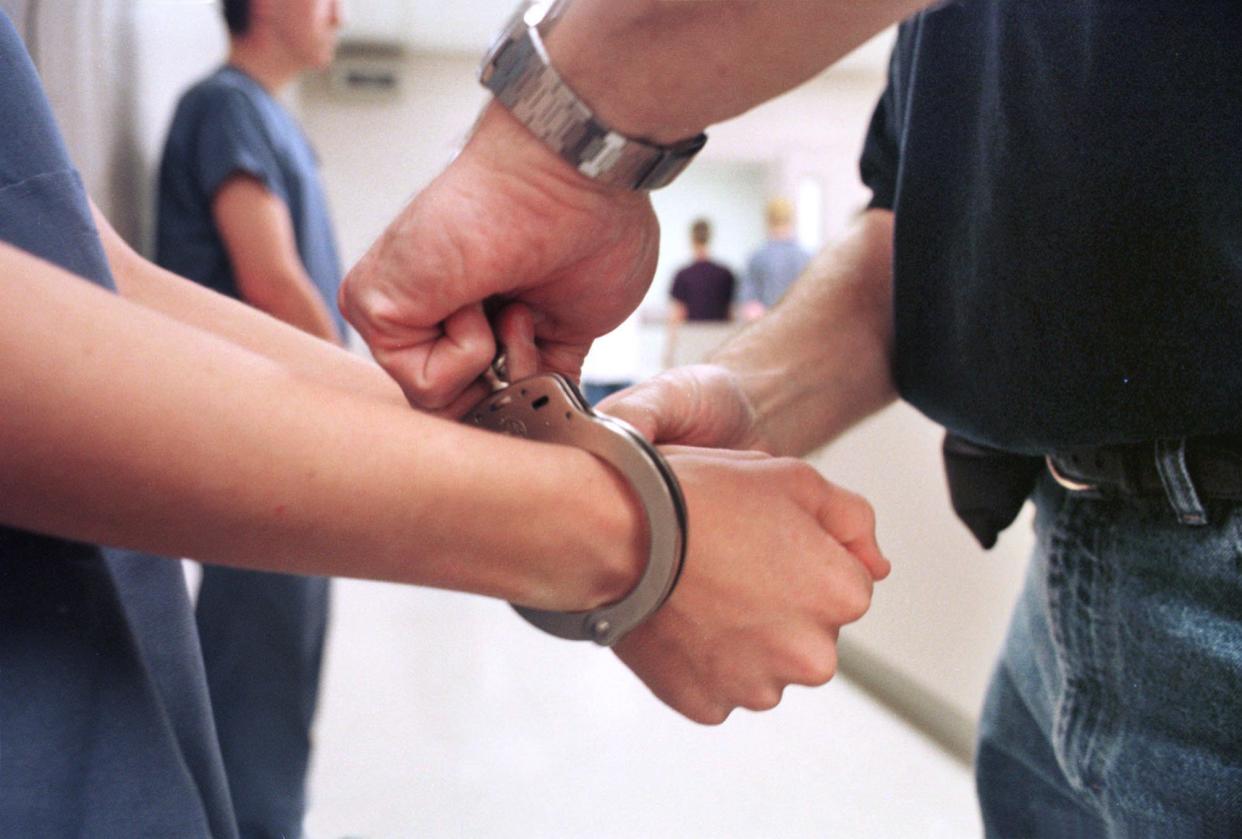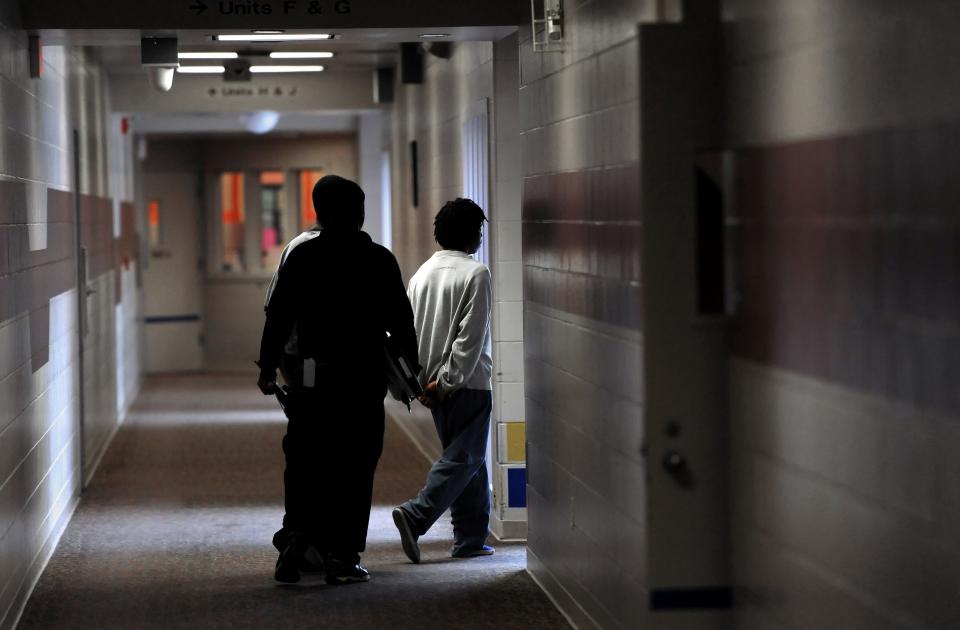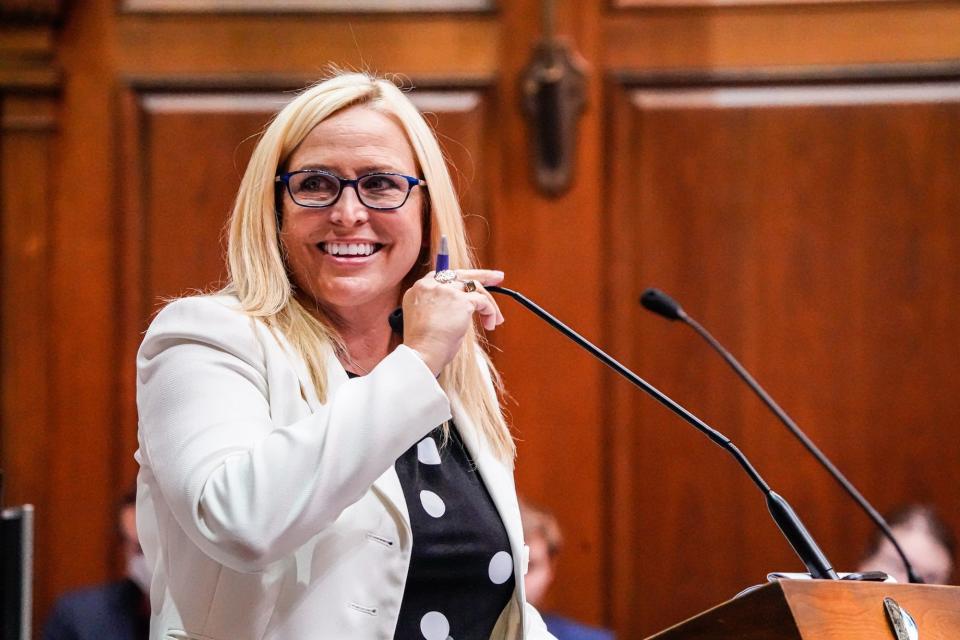Juvenile injustice: Low-income families pay brunt of fees and fines that vary by county

Rick Dempsey said his son was a good kid.
“Straight-A student, honor roll, taking all college-level classes,” said Dempsey, a Porter County resident. “Super smart, stud football player.”
But everything changed, Dempsey said, after he and his son's mother divorced in 2017.
Soon after the split, his then-teenage son was caught stealing, put on probation and required to take a drug test. Dempsey said he was told the test would serve as a “baseline” for his son and that he would not be detained. But, after the teen tested positive for marijuana, he was pulled into Porter County’s juvenile justice system and sent to a drug court program.
“They lied right to my face,” Dempsey said.
Like many parents or guardians with children who get involved in the juvenile justice system, Dempsey was liable for fees and costs related to his son’s case. In Porter County, that meant a $176 initial court fee, a $90 informal adjustment fee, a $100 initial probation user fee and $25 in monthly probation fees. In many other cases, it also means a $110 per day detention fee.
Dempsey, a union heavy equipment operator, also had to attend drug court programs with his son for nearly three years. Between the required counseling appointments, classes and court hearings, over one six-month period Dempsey drove his son to and from related obligations five nights a week, right at 5 p.m. He lost a couple of jobs for leaving work an hour early.
One Sunday, Dempsey found a warrant for his arrest in his mailbox. Court officials had failed to notify him of a hearing. The juvenile court didn’t open until the next morning, so he turned himself in at the police station.
“I go down there, pay them. They arrest me,” he recalled. “They literally book me … arrested me, mugshots, stripped me, the whole nine yards.”
Despite paying the missing court costs, Dempsey had to spend a night in jail. He had time to stew and come to a conclusion.
“The juvenile justice system has nothing to do with the juvenile,” he said. “It has everything to do with getting money off of the parent.”
This can be especially true in Porter County.
Justice by geography
In 2021, Porter County collected $82,411 in fees from parents whose children were involved with its juvenile justice system. Fees collected from Porter County parents amounted to more than double the second-place county and accounted for about one-third of the $245,925 total across Indiana.
A two-month investigation into juvenile justice fines and fees in Indiana by students in the University of Notre Dame’s Gallivan Program in Journalism, Ethics, and Democracy uncovered a system where justice, particularly in a financial way, varies greatly by county — the sum of fines and fees charged to families depending largely on where they live.
A 2023 report by the Juvenile Law Center on the fiscal impact of eliminating juvenile case fees called these differences: “Justice by geography.”
A study from the Indiana Public Defender Council that looked at the 82 counties using the Odyssey Court system between September 2016 and September 2021 found that rural Perry County in southern Indiana charges the most per case in juvenile costs and fees in the state — around $4,100 per case.
Meanwhile, Marion County, Indiana’s largest county, charges the least per case, about $57.
Of the nearly 10,000 cases the council studied, the average charge of around $500 is distorted. While many families are charged nothing, some are burdened with as much as $30,000 or more.
There was one area the study found to be equal across the board: Less than half of the juvenile court fines and fees ended up being collected.

Over the five-year period measured in the study, more than $4.7 million in fines and fees was assessed to Indiana families. Of that, about $2.1 million was actually paid. In Perry County, only about 15 percent was collected.
Joel Wieneke, a senior staff attorney with the Indiana Public Defender Council, helped conduct the study. He said smaller counties often charge families more but collect less.
“It's pretty onerous, though, for some families to have to get hit with that, especially at a time when they're dealing with a family crisis,” he said. “It's not equally spread out throughout the state.”
The five fees
Seymour “Sy” Moskowitz, a Valparaiso University family law professor emeritus, said juvenile justice fees fund a variety of public services, and much of the money pays the salaries of probation officers.
“And so you now have a system which is kind of feeding on itself because, if you eliminate these costs and fees, these people wouldn’t be having a salary, because the county is probably — and I’m pretty sure of this — unwilling to pick up the costs of that,” Moskowitz said.

Currently, Indiana families can be assessed juvenile justice fees in five major categories: secure detention fees, probation fees, attorney fees, Department of Correction (DOC) fees and Department of Child Services (DCS) fees.
Secure detention fees can be some of the most costly. But like other fines and fees, the amount varies. Some counties don’t even charge a detention fee. Others charged $150 to $180 a day for a child to be housed in a juvenile detention facility, Wieneke said. While most juveniles are only detained for two to seven days, Benjamin Fryman, a Porter County juvenile public defender, said some can be detained for 30 days or more.
“If you live in a county that doesn’t have a juvenile detention center, your county’s court is paying a per diem fee to another center outside your county,” Wieneke said. “They try to shift these fees back to the families.”
Although all but one county has its own jail, Wieneke said having a juvenile detention center in every county isn’t currently possible because kids have greater educational and rehabilitation needs. To detain a juvenile costs about triple what it costs to detain an adult.
Indiana operates 19 juvenile detention facilities, about one for every five counties in the state. Many of Indiana’s largest counties manage their own detention centers. These counties are able to spread the costs amongst all county taxpayers rather than pass them along to parents.
But in counties where parents are saddled with detention fees, it can take quite a while for some families to pay off the debt. The case J.T. vs the State of Indiana provides one dramatic example.
A Lawrence County juvenile, known as J.T. to protect his identity, was committed to the Department of Correction after multiple incidents of auto theft, truancy and removing a court-issued electronic monitor. J.T. racked up $5,100 in detention fees during his time in the juvenile justice system. In 2018, the court ordered his mother to pay a total of $8,363 in fines and fees related to J.T.’s case.
J.T.’s father was in prison, and, according to court records, his mother earned “meager wages.” She agreed to pay $20 a month toward the total amount owed. The resolution put her on a nearly 35-year payment plan.
The appellate opinion released in J.T.’s case referenced a 1998 precedent that ordered even loftier payments. In that case, Matter of C.K., parents of a juvenile delinquent were ordered to pay $100 a week after their child racked up $52,276 in detention fees.
J.T. and his mother brought their case before a three-judge panel, which ultimately ruled that it was fair for the juvenile’s mother to pay back the balance because she had agreed to do so. One judge, however, dissented.

“I, unlike the majority, am convinced that a ‘large financial burden,’ … was imposed on the parents, in that they are subject to a judgment that, at the current rate of payment, would not be satisfied for approximately thirty-five years,” wrote L. Mark Bailey, the dissenting judge.
Though families rack up the most expensive court bills through detention fees, the state makes most of its juvenile collection money from probation fees. Between September 2016 and September 2021, over $517,000 in probation fees was collected from the 82 counties studied. That is more than twice the roughly $198,000 collected in detention fees over the same period.
Moskowitz said families generally pay a $100 initial probation user fee and then $15 to $25 in monthly fees for the entire period their child is on probation. Juvenile probation typically lasts at least six to nine months.
While many fines and fees go uncollected, the Juvenile Law Center found the rate of collection was highest for probation fees — nearly 60%. Conversely, only about 23% of detention fees were paid back in the same period.
Recidivism and bias
The fines and fees have been found to have a disproportionately negative impact on people living in poverty.
A 2016 Juvenile Law Center report found that, in Indiana and at least 21 other states, families can essentially “pay their way out” of the juvenile justice system by paying informal adjustment fees.
Research has shown that young people directed into effective diversion or informal adjustment programs have better outcomes and are less likely to reoffend than their peers who are formally processed.
But that’s not an option for many families in Indiana, where more than 15% of the state’s children live at or below the federal poverty level.
“If your kids are getting formally prosecuted in the juvenile court system, and you’re taking advantage of those services, more often than not, you are a family of limited means,” Wieneke said.
Harold Harper, one of two juvenile delinquency public defenders in Porter County, said many of the families he works with are already facing immense financial struggles.
“We’ve got some families who are living not even paycheck to paycheck,” he said. “They’re living Medicaid check to Medicaid check — it can’t even pay their rent, let alone gas and electricity and food, and then they’re getting saddled (with the court fees and fines).”

Harper said the juvenile justice system also has an outsized negative impact on children of color, who make up an inordinate percentage of kids in the system. While the disparity in Porter County has improved, Harper said it still “has a long way to go racially.”
“Are minorities disproportionately impacted because, oftentimes, they are percentage-wise more economically disadvantaged? Absolutely,” he said. “I always have a concern about how minorities are treated in any criminal justice system.”
On the national level, multiple recent studies have shown youth and families of color are more negatively impacted by fines and fees.
In Florida, a 2022 University of Miami study found, there were “no racial or ethnic differences in the proportion of youth receiving fees, both Black and Hispanic youth were assigned significantly higher amounts in cases where fees were levied. The difference: Black youth were assessed an average of $709.50; Hispanic youth, $633.30; and white youth, $426.50.”
James Jankowski of Porter County, a retired third-grade teacher, said he noticed how racial bias worked in his family’s favor when his adopted Black son became involved in the juvenile justice system.
Jankowski’s son, who has fetal alcohol syndrome, had been involved in the system since he was in middle school. He has had two long-term residential placements. If he didn’t have insurance, Jankowski said his son could have “easily racked up $100,000” in detention fees.
When Jankowski first learned he had to pay fees related to his son’s case, he said he was pulled aside. A court official told him they would probably be able to wipe out many of the fees.
“I’m a white guy. I did 20 years in the military. I’m a teacher in the community,” he said. “I don’t know if that’s why they treated me differently.”
Ultimately, Jankowski said his son’s time in the juvenile justice system didn’t even help him. In fact, he said it may have desensitized him to the seriousness of going to jail.
“I mean, he’s been locked up twice already as an adult,” Jankowski said. “He doesn’t really view it as that big of a deal. If he gets arrested, he gets arrested … That’s not a good mentality to have.”
The experience of Jankowski’s son reflects an alarming finding consistent across national and statewide studies: juvenile justice fines and fees increase recidivism rates.
The University of Miami study found that 19.4% of system-involved youth in Florida who were charged fees went on to commit a new crime, compared to 15.7% of system-involved youth who were not charged fees.
Fines and fees can also keep kids in the system longer, dragging them deeper into debt.
“Some young people in some states, if they don’t pay their costs and fees, they are kept in the system longer, which incurs more debt,” said Ebony Stoutmiles, a state policy advocate for the Juvenile Law Center’s Debt Free Justice project. “Then, they’re stuck on probation longer, and the longer you are on probation, the easier it is to get in trouble.”
Small steps toward reform
There have been multiple attempts over the years to reduce or altogether eliminate fines and fees in Indiana’s juvenile justice system. One of these efforts, Indiana House Bill 1493, written by Rep. Wendy McNamara (R-Evansville), was signed into law by Indiana Governor Eric Holcomb on May 1, 2023.

However, while HB 1493 did address some fines and fees, it did not eliminate all, or even some of the most costly, fines and fees in the state. Namely, it does not address secure detention or probation fees.
“[HB 1493] was nothing like what I had hoped when we started this effort to try to do some legislative law reform,” Moskowitz said. “This is a very, very small bite in a very big apple. So, it’s a positive thing, but it’s not necessarily going to solve anything in a major kind of way.”
Wieneke spoke about HB 1493 in a House meeting on March 13, 2023. Similar to Moskowitz, he said the bill is “a step in the right direction, but it’s not a huge step in the right direction.”
HB 1493 addressed three types of juvenile justice fines and fees in Indiana: attorney or public defender fees, Department of Correction (DOC) fees and Department of Child Services (DCS) fees.
Currently, parents of juvenile delinquents are expected to pay all three of these fees unless the court determines that they are indigent, or financially unable to pay. HB 1493 flipped this. The new law states that parents are not expected to pay attorney, DOC or DCS fees unless the court “makes a specific finding” that they are financially able to pay these fees.
But these three fees account for relatively few of those assessed to Indiana families.
Both DOC and DCS fees cover residential placements. Kids who have committed “the most severe juvenile delinquency offenses” are sometimes sent to DOC facilities, where they’re housed alongside kids being prosecuted in adult court, explained Wieneke, the staff attorney with the Indiana Public Defender Council.
Kids sent to DCS residential facilities include both those removed from their parents because of abuse or neglect and juvenile delinquents whose offenses weren’t severe enough to warrant DOC placement.
Counties seldom even assess DOC or DCS fees because “the state picks up the tab” for these state agencies, Wieneke said. Therefore, these fees, unlike others such as detention and probation fees, do not impact individual county court budgets.
In fact, Wieneke said he only knows of a single county that routinely “goes after” families to pay DOC fees. As for DCS fees, the Indiana Public Defender Council found that over the course of five years, less than $9,000 in DCS fees were assessed statewide.
In contrast, during the same time period, nearly $850,000 in detention fees were assessed to families across the state.
Attorney or public defender fees often also have a negligible impact on a family’s balance, but, like detention fees, attorney fees can vary drastically from county to county.
In most cases, Wieneke said, a one-time fee of $50 or $100 is collected in attorney fees. However, he said some smaller counties have been known to assess “as much as a few thousand dollars” in attorney fees.
“The two counties that come to mind where I’ve seen this were Blackford County and Benton County,” he said. “I’d have to look, but I think it was like around $2,000.
“It’s the smaller counties that cannot spread these costs over a large population base that are much more likely to come after these families in order to try to collect these fees.”
Solving fines and fees
In Wieneke’s opinion, the solution to the fines and fees problem can be stated simply: tax the entire state of Indiana a sliver more each year.
The Indiana Public Defender Council study found that less than $5 million in fines and fees was assessed statewide over the course of five years. By increasing the state’s yearly revenue by about 15 cents per Hoosier resident, juvenile justice fines and fees could potentially be done away with completely, Wieneke said.
Five states — Delaware, Maryland, New Jersey, New Mexico and Oregon — have abolished all fines and fees in the juvenile justice system. Another four — California, Colorado, Louisiana and Nevada — have eliminated all juvenile court fees.
California, Colorado, Maryland, New Jersey and Oregon have also instituted measures to relieve juveniles and their families from outstanding debt accumulated from fines and fees. Because less than half of the fines and fees assessed are ever paid back, it often costs more to collect these fees than is actually collected.
“We often spend more time and money … trying to get those dollars back from the juveniles or their parents than we do in collecting them,” said Rep. Wendy McNamara (R-Evansville), the author of HB 1493 at the 2023 hearing.
While Indiana does not track data related to the costs of collecting fines and fees in a centralized manner, states that do support McNamara’s conclusion.
For example, the Juvenile Law Center found Oregon spent $866,000 in 2019 to collect $864,000 in youth custody fees. The report also found that Colorado spends 75 cents for each dollar it collects in juvenile fees.
High costs and low-collection rates are reflected in the outcomes of juvenile cases in Indiana. Ultimately, neither Rick Dempsey nor James Jankowski ended up paying the total balance of fees they were assessed.
After his night in jail, Dempsey still owed “[around] $3,000 to $4,000” in fines but was informed that the rest could be wiped away if he paid $150 that day. He paid, and his involvement with the Porter County juvenile justice system was finally over.
Most of the fees related to Jankowski’s son’s case were wiped out as well.
“It kind of felt like a game,” Jankowski said. “You have to pay so many payments in a row to show that you can pay them, and then they look at removing them. If it’s not really a bill for $10,000, if it’s really a bill for $600, it would be nice to know that.”
This article originally appeared on Indianapolis Star: Juvenile injustice: Fines and fees differ widely by county in Indiana

